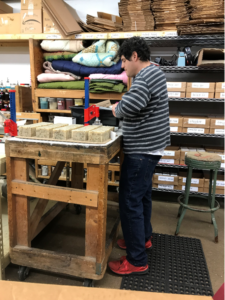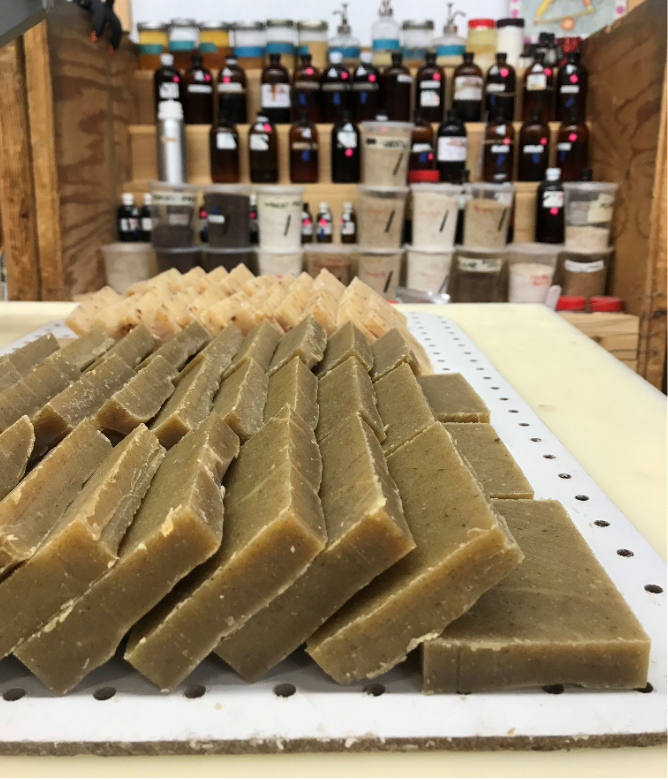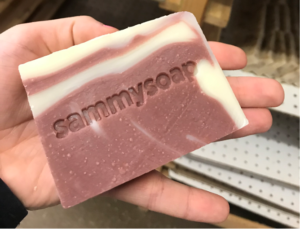Written by Madeline McDermott
Light shines through the big windows of the storefront, which display the hustle and bustle of historic downtown Kirkwood, and smells of lavender and rosemary essential oils hang in the air.
Sammysoap, named after Co-Founder Karen Copeland’s son Sam, is a small business located in St. Louis which creates 100% natural bar soaps in house, and sells a variety of skincare products, fair trade gift items and accessories.
Co-Founders Copeland and Beth Forsee used their areas of strength and interest to develop their progressive business model. Copeland initially had the idea to create soaps and employ individuals with disabilities as their soapmakers to offer a more esteemed work opportunity, and Forsee had experience in business development and sales.
“We’re much more than a soap store,” Forsee said. “Once we take care of our customer’s needs, we want them to have fun, shop around and hopefully, find a fun gift for themselves or another. Every time they walk in the door, we want them to share the sammy love.”
Sammysoap customer, Tory Kassabaum, originally drawn to sammysoap because of their mission to employ individuals with disabilities, says she gets a different bar of soap each time she visits and appreciates the absence of plastic in their packaging.
“They’re all wonderful, but my favorite thing is their shampoo bar,” Kassabaum said. “I was hesitant to use a shampoo bar with longer hair, but wanted to cut down on my plastic usage, and found that it actually works great. There are lots of suds, and it actually makes my hair feel clean,” Kassabaum said. “I also just started using the baby bar on my baby, and it’s also great.”
Copeland says sammysoap uses a wide variety of all-natural ingredients, such as essential oils and animal fats to blend their bars, and says that aromatherapy and using essential oils is a legitimate medical model in Europe.
According to The Healthy Focus Organization’s website, essential oils have a history of being used for aromatherapeutic purposes dating back to 4500 B.C.E. Today, they are often used homeopathically to help ease stress, anxiety and depression and to boost overall wellness. According to a study by the National Cancer Institute, cancer patients massaged with chamomile essential oil had lower anxiety levels over a two-week period compared to patients massaged without any type of essential oil.
Copeland says she believes a greater number of people in the United States are beginning to understand the power of natural products because of some of the negative reactions they are experiencing from more generic commercial products.
“Some people are allergic, or have an adverse response to these synthetics [often used in commercial soaps],” Copeland said. “Why give your body something it has to defend itself against?”
Copeland took this passion for providing consumers with all-natural, earth-friendly products and combined it with a mission — to help establish more dignified working opportunities for people with disabilities. Copeland’s son, Sam, has an intellectual disability, and Copeland said she was disheartened when he was given limited options upon graduating high school. These options were in part due to the change in terminology for people with disabilities adopted by the federal government in 2013, which replaced the term “mental retardation” with “intellectual disability.” Although this new terminology is not as negatively stigmatized, it also made it so a wider variety of people could be grouped together.

Copeland’s mission is to help establish more dignified working opportunities for people with disabilities.
“[Due to the shift in terminology] now they can roll everyone together,” Copeland said. “So Sam’s outcome was either a sheltered workshop or an Alzheimer’s unit. There was no community and integration at all.”
The Social Security Administration defines a sheltered workshop as “a private non-profit, state, or local government institution that provides employment opportunities for individuals who are developmentally, physically, or mentally impaired, to prepare for gainful work in the general economy.” Copeland says she feels they are fundamentally discriminatory.
“In the late fifties and early sixties, the workshops were thought of, and they were great, a step in the right direction,” Copeland said. “However, some 40 years later, the commercial side has continued to build, where the social services side is exactly the same. It’s sub-minimum wage, it’s sweatshop stuff.”
Copeland says she would love to be part of the solution moving this forward. She and Foresee employ individuals with intellectual disabilities, supplying them with agency and liveable wages. Copeland and Forsee say they modify the workstations in the soap factory so everyone is able to use them effectively.
Soapmaker Jesse Grazes says he loves working at sammysoap.
“I couldn’t be happier working here,” Grazes said. “I love the people I work with, and it’s just a great place to be.”

